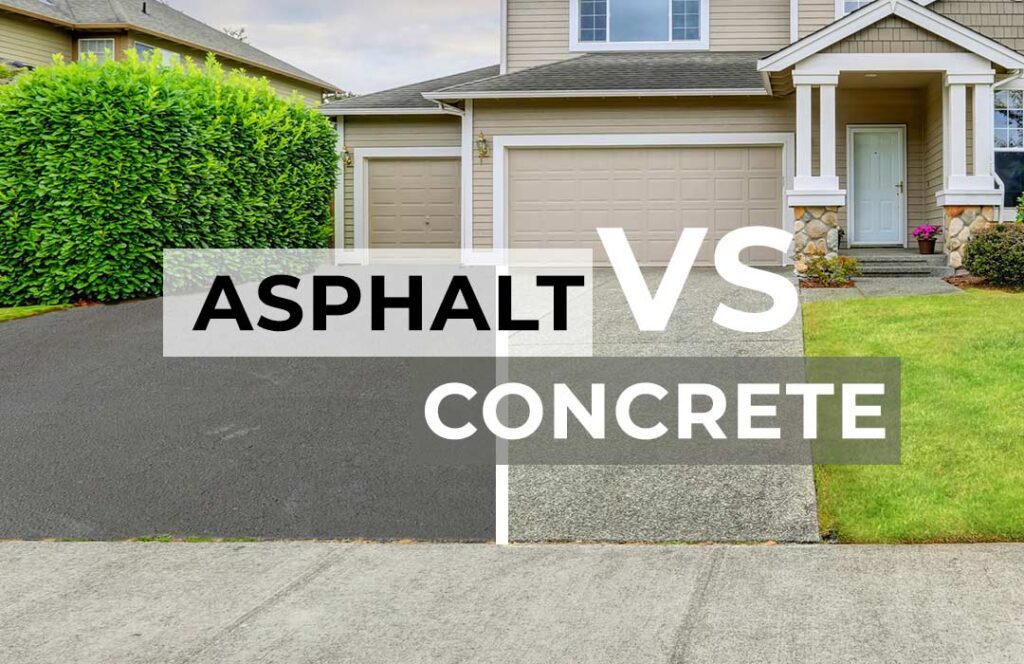25 Aug Unveiling the Power of Pressure Washing: Concrete vs. Asphalt
Introduction
When it comes to restoring the beauty of your outdoor spaces, pressure washing emerges as a remarkable solution. Among the most common surfaces that require a thorough cleaning are concrete and asphalt. In this blog, we will delve into the differences between concrete and asphalt, explore the efficacy of sodium hypochlorite as a cleaning agent, and understand why one surface can be cleaned with it while the other cannot.
Concrete: The Stalwart of Strength
Concrete, renowned for its durability and strength, is a widely used construction material for driveways, sidewalks, patios, and other outdoor structures. Despite their ruggedness, concrete surfaces are susceptible to accumulating dirt, grime, algae, mold, and mildew over time.
Pressure Washing Concrete
Concrete surfaces can be revitalized effectively using pressure washing techniques.
Pressure washing is an effective technique for revitalizing concrete surfaces. The sheer force of water ejected from the pressure washer, combined with the appropriate nozzle and pressure settings, can dislodge stubborn dirt and grime. However, in some cases, a suitable detergent or cleaning solution may be necessary.
Sodium Hypochlorite and Concrete
The role of sodium hypochlorite in cleaning concrete surfaces.
Sodium hypochlorite, commonly known as bleach, is a potent cleaning agent. When used with caution and in the right concentration, it can be employed to remove mold, mildew, and algae from concrete surfaces. However, due to its corrosive nature, careful dilution and application are essential to prevent damage to the surrounding vegetation and surfaces. Excessive use of sodium hypochlorite can degrade the concrete itself over time, leading to discoloration and deterioration of the surface.
Asphalt: The Flexible Foundation
Asphalt, often referred to as blacktop, is a mixture of aggregates, binder, and filler. It offers a flexible and cost-effective solution for constructing driveways and roadways. While asphalt is resilient, it is not impervious to the elements.
Pressure Washing Asphalt
Applying pressure washing to maintain asphalt surfaces.
Pressure washing can also be applied to asphalt surfaces, but with certain considerations. The pressure settings need to be adjusted to prevent excessive force that could potentially damage the surface or widen existing cracks. Additionally, the choice of detergent or cleaning solution is crucial, as abrasive substances can wear down the asphalt’s protective layer.
Sodium Hypochlorite and Asphalt
Understanding the incompatibility of sodium hypochlorite with asphalt.
Unlike concrete, asphalt should not be cleaned with sodium hypochlorite. The corrosive nature of bleach can lead to the breakdown of the asphalt binder, causing the surface to become brittle and prone to cracks. Moreover, sodium hypochlorite can react with the oils present in asphalt, exacerbating the deterioration process. For asphalt cleaning, it’s recommended to use specialized asphalt detergents that are formulated to dissolve oil stains and grime without harming the surface.
Choosing the Right Approach: Concrete vs. Asphalt

Making informed decisions for effective cleaning.
Selecting the appropriate cleaning approach for concrete and asphalt surfaces is essential to achieve optimal results without causing unintended damage.
Surface Inspection: Assess the condition of the surface, identifying contaminants and existing damage.
Pressure Settings: Adjust pressure settings according to the surface; use lower pressure for asphalt.
Cleaning Solutions: Use sodium hypochlorite sparingly for concrete; opt for asphalt-friendly detergents.
Testing: Perform a small patch test before full-scale cleaning to gauge impact.
Conclusion
Pressure washing presents a transformative solution for revitalizing concrete and asphalt surfaces. By understanding their differences and following best practices, you can restore the splendor of your outdoor spaces while ensuring their longevity. Consult professionals for expert insights and a hassle-free cleaning experience that enhances curb appeal while safeguarding your investments.


